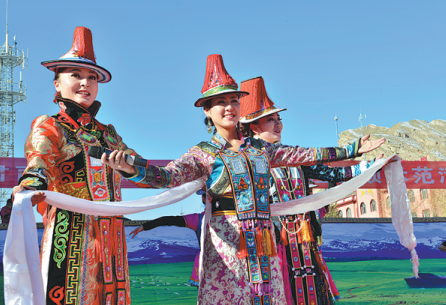Collector helps Yugur culture stay alive

Members of the Yugur ethnic group wear traditional dress to take part in a cultural event held in Sunan in June. [Photo/China Daily]
Art and administration
Ke is a gifted artist. In 1984, she won one of the top prizes in a painting contest held in her hometown in Sunan Yugur autonomous county, which is administered by Zhangye. Three years later, she was admitted to the fine arts major at Northwest Minzu University in Lanzhou, Gansu's capital.
"During my college years, I visited a museum for the first time. I then realized that what I had been doing was 'collecting'. The more I learned in college, the more I felt that the Yugur culture needs to be better protected," she said.
After graduation, Ke worked for the Sunan county cultural center as an administrator while continuing her collecting activities.
On one occasion, she heard that a herder was selling a traditional leather bag for 2,000 yuan. She borrowed the money but discovered that the item had already been sold.
Undeterred, she copied the style and made a similar bag. "Things like that bag are becoming rarer. A copy can at least let people know of its existence," she said.
Over the years, Ke has traveled across Gansu in search of folk items and Yugur craftsmen who could teach her traditional skills such as leather carving.
As her activities became well-known, some Yugur donated their old items to her collection. One man presented Ke with his dead grandmother's beads because he knew she would protect them well and would never sell her collection for profit.
She said her most difficult time came in the 1990s, despite her growing fame, because of the debts she had incurred while building her collection. "Back then, I felt embarrassed when I could not buy my daughter an ice candy because I didn't have the spare cash," she said.
In 1992, she found a second source of income to supplement her earnings at the cultural center.
"I traveled to Shenzhen, Guangdong province, and sold my handmade, embroidery-decorated bags for $10 each to some foreign visitors there who appreciated our culture a lot."
Inspired by the experience, she opened a shop in her home county. In 2012, the store evolved into a workshop where she makes traditional Yugur costumes, tents and handicrafts.
"We make these items for museums that want to display them and for ceremonies such as weddings. I have to make money, otherwise my costly collecting career will end," she said.
The same year, she became a national inheritor of Yugur costume culture, recognized by the then Ministry of Culture, now the Ministry of Culture and Tourism.
"I felt more responsibility on my shoulders after that," she said.
In her spare time, Ke traveled across the Sunan countryside. In 2012, she spent more than a month tracing the nomadic routes of the ancient Yugur people.
The journey spanned Zhangye, Dunhuang in Gansu and Turpan in the area around the Tianshan Mountains in the Xinjiang Uygur autonomous region.
"It was a rewarding trip because I met and chatted with a lot of people, some of whom shared similar language and folk customs with the Yugur," she said.
-
As AI encounters Dunhuang's art, the ancient caisson ceiling bridges centuries to the present.
View all stories

 Gansu thrives from green development
Gansu thrives from green development  >
>